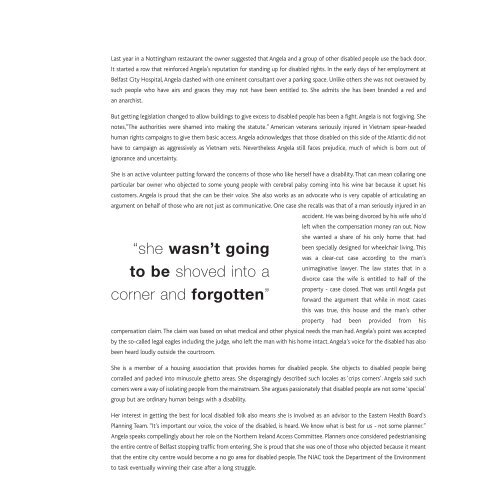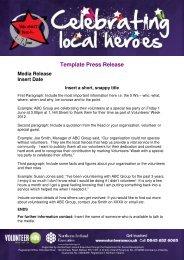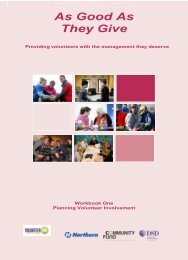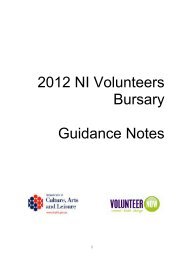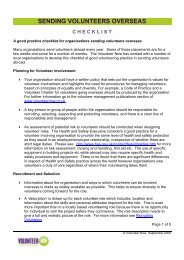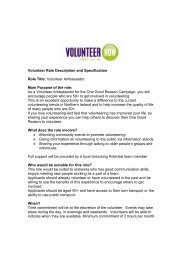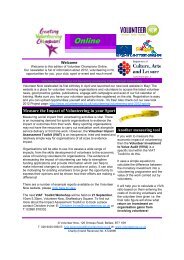Stories from the Edge - Volunteer Now
Stories from the Edge - Volunteer Now
Stories from the Edge - Volunteer Now
Create successful ePaper yourself
Turn your PDF publications into a flip-book with our unique Google optimized e-Paper software.
Last year in a Nottingham restaurant <strong>the</strong> owner suggested that Angela and a group of o<strong>the</strong>r disabled people use <strong>the</strong> back door.It started a row that reinforced Angela’s reputation for standing up for disabled rights. In <strong>the</strong> early days of her employment atBelfast City Hospital, Angela clashed with one eminent consultant over a parking space. Unlike o<strong>the</strong>rs she was not overawed bysuch people who have airs and graces <strong>the</strong>y may not have been entitled to. She admits she has been branded a red andan anarchist.But getting legislation changed to allow buildings to give excess to disabled people has been a fight. Angela is not forgiving. Shenotes,”The authorities were shamed into making <strong>the</strong> statute.” American veterans seriously injured in Vietnam spear-headedhuman rights campaigns to give <strong>the</strong>m basic access. Angela acknowledges that those disabled on this side of <strong>the</strong> Atlantic did nothave to campaign as aggressively as Vietnam vets. Never<strong>the</strong>less Angela still faces prejudice, much of which is born out ofignorance and uncertainty.She is an active volunteer putting forward <strong>the</strong> concerns of those who like herself have a disability. That can mean collaring oneparticular bar owner who objected to some young people with cerebral palsy coming into his wine bar because it upset hiscustomers. Angela is proud that she can be <strong>the</strong>ir voice. She also works as an advocate who is very capable of articulating anargument on behalf of those who are not just as communicative. One case she recalls was that of a man seriously injured in anaccident. He was being divorced by his wife who’dleft when <strong>the</strong> compensation money ran out. <strong>Now</strong>“she wasn’t goingto be shoved into acorner and forgotten”she wanted a share of his only home that hadbeen specially designed for wheelchair living. Thiswas a clear-cut case according to <strong>the</strong> man’sunimaginative lawyer. The law states that in adivorce case <strong>the</strong> wife is entitled to half of <strong>the</strong>property - case closed. That was until Angela putforward <strong>the</strong> argument that while in most casesthis was true, this house and <strong>the</strong> man’s o<strong>the</strong>rproperty had been provided <strong>from</strong> hiscompensation claim. The claim was based on what medical and o<strong>the</strong>r physical needs <strong>the</strong> man had. Angela’s point was acceptedby <strong>the</strong> so-called legal eagles including <strong>the</strong> judge, who left <strong>the</strong> man with his home intact. Angela’s voice for <strong>the</strong> disabled has alsobeen heard loudly outside <strong>the</strong> courtroom.She is a member of a housing association that provides homes for disabled people. She objects to disabled people beingcorralled and packed into minuscule ghetto areas. She disparagingly described such locales as ‘crips corners’. Angela said suchcorners were a way of isolating people <strong>from</strong> <strong>the</strong> mainstream. She argues passionately that disabled people are not some ‘special’group but are ordinary human beings with a disability.Her interest in getting <strong>the</strong> best for local disabled folk also means she is involved as an advisor to <strong>the</strong> Eastern Health Board’sPlanning Team. “It’s important our voice, <strong>the</strong> voice of <strong>the</strong> disabled, is heard. We know what is best for us - not some planner.”Angela speaks compellingly about her role on <strong>the</strong> Nor<strong>the</strong>rn Ireland Access Committee. Planners once considered pedestrianising<strong>the</strong> entire centre of Belfast stopping traffic <strong>from</strong> entering. She is proud that she was one of those who objected because it meantthat <strong>the</strong> entire city centre would become a no go area for disabled people. The NIAC took <strong>the</strong> Department of <strong>the</strong> Environmentto task eventually winning <strong>the</strong>ir case after a long struggle.


